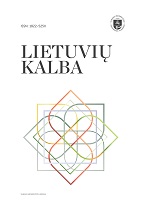Valstybinė lietuvių kalba tarpukariu
The Official Lithuanian Language in the Interwar Years
Author(s): Aldonas PupkisSubject(s): Education, Baltic Languages, Interwar Period (1920 - 1939), Politics and Identity
Published by: Vilniaus Universiteto Leidykla
Keywords: language policy; official language; language education; Lithuanian Language Society; theory of standard language;
Summary/Abstract: The article aims to show the state of the Lithuanian language in the years of the national movement at the turn of the 20th century and its functioning in the restored independent Lithuanian state from 1918 up to 1940 when it was occupied by the USSR. Under the rule of the Russian Empire, the Lithuanian language was confined to the domestic setting: the press in the Latin script was banned and the use of Lithuanian in public was prohibited. As a continuation of the Springtime of Nations, the Lithuanian national movement relied on the Lithuanian-speaking society, and the language was perceived as one of the most important components of Lithuanianness. Scientific literature sometimes claims that the Lithuanian identity has been built on the philological foundation. This idea can be found in the history of many European nations, so the emphasis on the native language in Lithuania was nothing out of the ordinary. Drawing on national legislation and archival data, the article outlines how the Lithuanian language was taking root in the state that declared its independence in 1918. Reform of the economy, development of culture and education, the choice of the Western way of life, and formalising Lithuanian as the official language in the 1922 Constitution, created favourable conditions for the Lithuanian language and culture to function independently in the entire public life. The development of the Lithuanian language in the years of independence is analysed in three dimensions: legal (introducing the official language in all areas of life), structural (conducting research of the language, compiling the great dictionary, etc.), and educational (developing the modern theory of standard language grounded in structuralism and implementing its principles). The ideological basis of the educational work (as part of national upbringing), its implementers (the Lithuanian Language Society, different commissions and organizations), and the results thereof are also discussed.
Journal: Lietuvių kalba
- Issue Year: 2023
- Issue No: Supplement
- Page Range: 36-62
- Page Count: 27
- Language: Lithuanian

